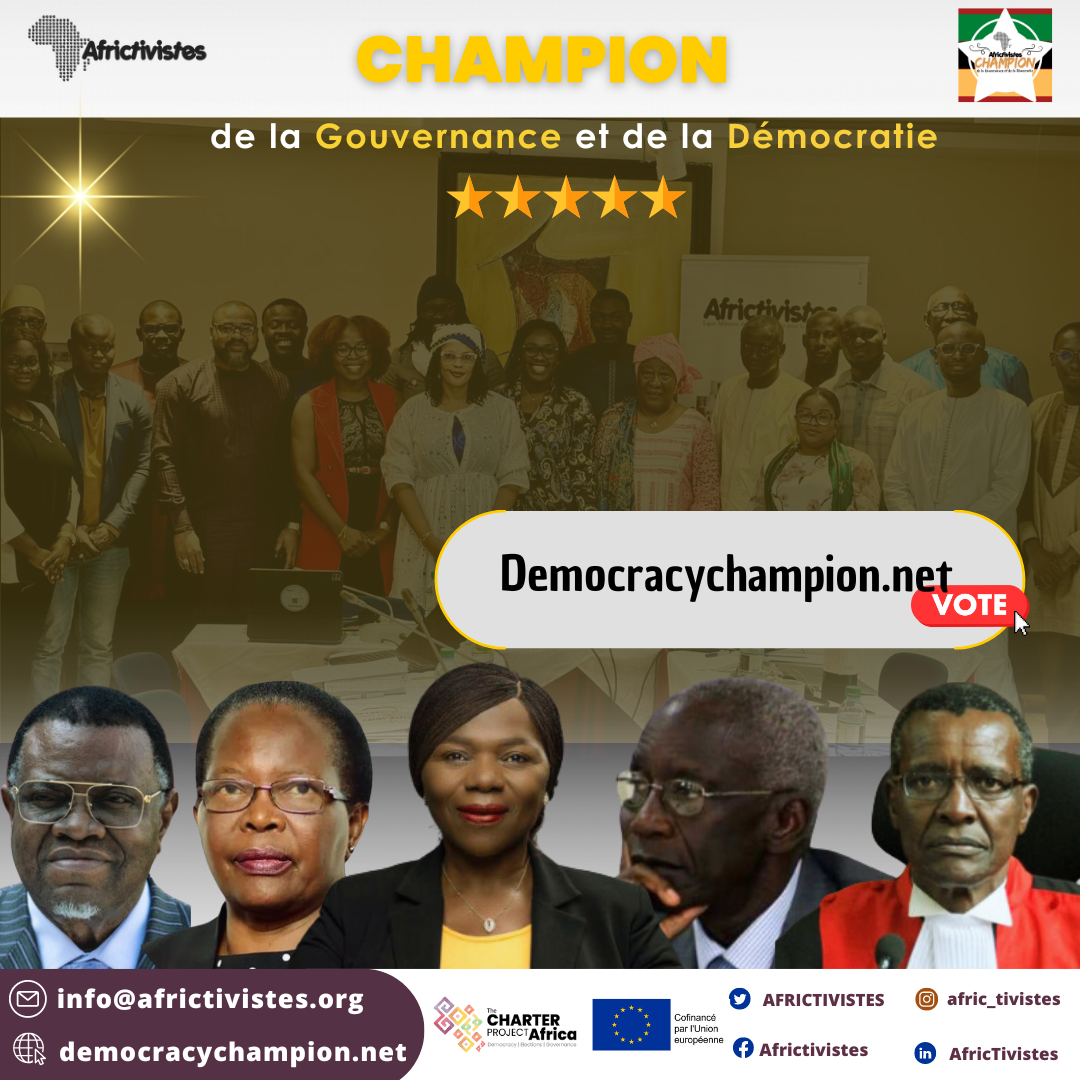June 21, 2024 by Mamadou Mb. DIONE
AfricTivistes urges African citizens to choose an African Governance, Democracy champion

AfricTivistes initiated the African Governance and Democracy Champion recognition to help promote democratic governance in Africa through a more open and civic-minded approach. The public vote started on June 21th, following a detailed sorting and pre-selection process carried out by a panel of experts between January and May. This third phase of the process allows African citizens to choose a champion from the five shortlisted and nominated by the panel of judges. The champion will be officially announced in Abidjan on 27 June.
At a time when democratic gains are under threat in several African countries, AfricTivistes has launched the “AfricTivistes Champion of Governance and Democracy” initiative. This distinction aims to promote the values of good governance, democracy and respect for institutions in Africa through the promotion and defence of the fundamental principles of the African Charter on Democracy, Elections and Governance (ACDEG). The purpose is to single out an actor in political and public life or an entity (current or former head of State, public institutions, prominent state personalities, civil society organisations or leaders) who has had a substantial impact on the democratisation and good governance processes in his or her country between 2012 and 2023.
AfricTivistes is encouraging African citizens to identify the person they consider to have been the champion of governance and democracy in the performance of his or her duties following the identification of the nominees by the panel of judges.
After a rigorous shortlisting process, here are the five nominees proposed by the jury members :
-
Thuli Madonsela (“Protector of the People” from 2009 to 2016): a South African lawyer nicknamed “Madam Anti-Corruption”. She participated in drafting the Constitution in the 1990s. As “Public Protector”, she gained a reputation for her integrity, courage and commitment to justice and political accountability, particularly in the Nkandla affair. She now embodies integrity and the fight against corruption.
-
The Supreme Court of Kenya, embodied by David Maraga ( 19 October 2016 to 20 May 2021): this institution plays a crucial role in regulating the political and institutional landscape, helping to establish a culture of judicial independence in Kenya through its many precedents. It also remains one of the few, if not the only, constitutional courts to have annulled a presidential election. In 2017, the President of the Supreme Court, Judge David Maraga, made a historic ruling, annulling Uhuru Kenyatta’s victory and ordering new elections.
-
The Gambia’s Truth, Reconciliation and Reparations Commission embodied by Dr. Lamin Sise ( July 2017 - October 2018): Established in December 2017, this commission under the leadership of Dr. Lamin Sise had the main objective of establishing an impartial historical account of human rights violations committed between July 1994 and January 2017 under the presidency of Yahya Jammeh. It was also tasked with tracing the fate of missing victims and granting reparations.
-
President Hage Geingob (late 1941-2024):: he provided remarkable leadership for democracy and transparency in Namibia, as well as in continental governance. During his presidency, he took important measures to strengthen democratic institutions and promote citizen inclusion and participation.
-
Irene Chirwa Mambilima (late 1952-2021): as Chief Justice of Zambia’s Supreme Court until her passing, Mambilima played a crucial role in maintaining the independence and integrity of the judicial system. She strived to ensure that the court’s decisions were impartial and based on the law, thereby reinforcing public confidence in the judicial system.
The selection process is divided into three phases :
-
An advisory committee to validate the project’s Terms of Reference and approve the approach,
-
A selection committee made up of a jury to draw up the selection criteria and propose the list of nominees,
-
An open and inclusive public vote to identify the winner.
The selection criteria are: respect for human rights and fundamental freedoms; respect for the principle of the rule of law; peace, security, stability and development; participatory democracy and inclusion.
The jury is made up of members of the Advisory Committee and the Selection Committee. These two groups are made up of experts and leading figures from African civil society. One can cite, among others, Alioune Tine, Director of AfrikaJom Centre, Ibrahima Kane, Head of the African Union Programme at the Open Society Foundation; Paschal Chem, communications and democratic governance specialist in Africa; Professor Ndioro Ndiaye, President of the Alliance for Migration, Leadership and Development (AMLD) and Coordinator of the Réseau francophone pour l’Egalite Femme-Homme (RF-EFH)…
The public vote will be calculated cumulatively with those of the panel of judges. Vote for your champion on the platform : . Each public vote counts towards identifying the African Champion of Governance and Democracy in a free and independent manner.
The announcement of the AfricTivistes Champion of Governance and Democracy will take place on June 27, during a joint activity of the African Union and AfricTivistes dedicated to the promotion of the ACDEG.
The Champion’s initiative is part of the Charter Project Africa, which supports the implementation and ownership of the African Charter on Democracy, Elections and Governance (ACDEG). The initiative is co-piloted by partner civil society organisations. These organisations were represented on the Advisory Committee and the Selection Committee.
For any additional information, please send an email to: info@africtivistes.org.